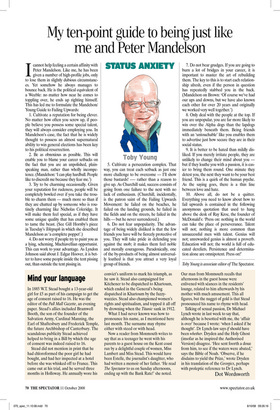Mind your language
In 1885 W.T. Stead bought a 13-year-old girl for £5 as part of his campaign to get the age of consent raised to 16. He was the editor of the Pall Mall Gazette, an evening paper. Stead’s allies included Bramwell Booth, the son of the founder of the Salvation Army, Cardinal Manning, the Earl of Shaftesbury and Frederick Temple, the future Archbishop of Canterbury. The scandalous publicity Stead achieved helped to bring in a Bill by which the age of consent was indeed raised to 16.
Stead did not mention in print that he had chloroformed the poor girl he had bought, and had her inspected at a hotel before she was whisked off to France. This came out at his trial, and he served three months in Holloway. He annually wore his convict’s uniform to mark his triumph, as he saw it. Stead also campaigned for Kitchener to be dispatched to Khartoum, which ended in the General’s being dispatched in Khartoum by the fuzzywuzzies. Stead also championed women’s rights and spiritualism, and topped it all off by drowning when the Titanic sank in 1912.
What I had never known was how to pronounce his name, as I mentioned here last month. The surname may rhyme either with steed or with head.
Now a reader from Monmouth writes to say that as a teenager he went with his parents to a guest house on the Kent coast run by a delightful couple of women, Miss Lambert and Miss Stead. This would have been Estelle, the journalist’s daughter, who had written a memoir of her father. ‘He read The Spectator to us on Sunday afternoons, ending up with the Bank Rate!’ she noted. Our man from Monmouth recalls that afternoons in the guest house were enlivened with séances in the residents’ lounge, related to him afterwards by his mother with much amusement. This all figures, but the nugget of gold is that Stead pronounced his name to rhyme with head.
Talking of sexual passion, Dr Michael Lynch wrote in last week to say that, although he is besotted with me, the ‘affair is over’ because I wrote: ‘when I asked if he thought’. Dr Lynch-law says if should have been whether. Dryden and the Holy Ghost (insofar as he inspired the Authorised Version) disagree. ‘Hee sent foorth a doue from him, to see if the waters were abated,’ says the Bible of Noah. ‘Observe, if he disdains to yield the Prize,’ wrote Dryden in his translation of the Georgics, perhaps with proleptic reference to Dr Lynch.
Dot Wordsworth










































































 Previous page
Previous page